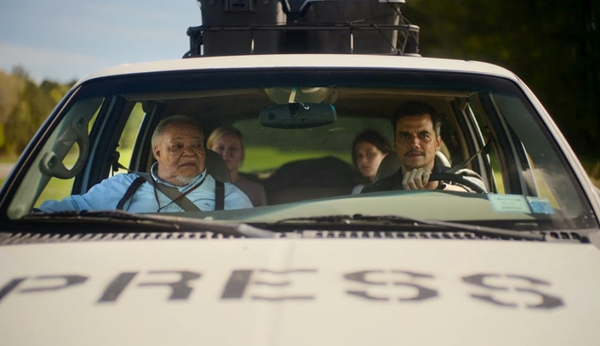
More than any other recent movie, Alex Garland’s Civil War is a Rorschach test on screen. Like the photojournalists at the center of its story, Civil War presents a series of images and situations and asks the viewer to fill in the rest. Whether it be a lack of imagination on my part, or a failing of the film, sometimes all I can see are ink blots on paper.
Kirsten Dunst plays Lee, a hardened war photographer making her way across a war-torn America with her colleagues Joel (Moura) and Sammy (Stephen McKinley Henderson). When she helps a young, aspiring photographer named Jessie (Spaeny), the character latches on to Lee, wanting to follow in her hero’s footsteps. From New York, the four members of the press intend to go to Washington D.C. to get the first, and what they expect to be the last, interview with the third-term president in 14 months.
The film follows the foursome on the road, where they encounter the horrific effects of the war all across the country. They stop for gas, where they haggle the price down to 300 Canadian, and the three armed men manning the station show them the “looters” they strung up in the car wash. One of them poses for a picture in front of the half-dead prisoners. They follow a firefight where a man is pinned behind a pillar as his fellow soldiers try to get him to safety, and Jessie starts to get the courage to capture the moment on film, snapping a photo of the dying man.
I’ve seen some frustration that the movie never tells you which side is which, or what the ideologies are that are held so strongly as to convince each side to tear the country apart despite themselves. I’ve heard people praise it for “leaving politics out of it.” I don’t know how anyone could watch this movie and think it is apolitical. Precisely because it isn’t preaching from the right or the left (not to be confused with a cowardly “centrist” stance), the film is very politically an anti-war movie. And maybe I’m bringing this to the Rorschach test myself, but I’d also argue it’s an anti-gun movie.
Their harrowing journey through the country, through small towns and survivor encampments, is met with guns and gunfire. By the end it becomes an ever-present, arrhythmic drumbeat, the backdrop against which Lee finally breaks, Jessie finally hardens, and the god of war claims two more souls.
Dunst leads a crew of stellar performances, with Spaeny proving why her star is on the rise, from starring in this year’s Priscilla to her role in the upcoming Alien: Romulus. The pieces are all in place, from the performances to the cold, documentary-like direction and the excellent soundtrack featuring the unsettling yet catchy drones of Suicide.
And yet, Civil War ultimately left me cold. It’s a victim of its own style, trapping its tragedies behind too many layers of journalistic distance—the main characters’ “document only” approach, and then the filmmakers’ thematically matching perspective. It dulls its effect, turning its images back into ink blots.














